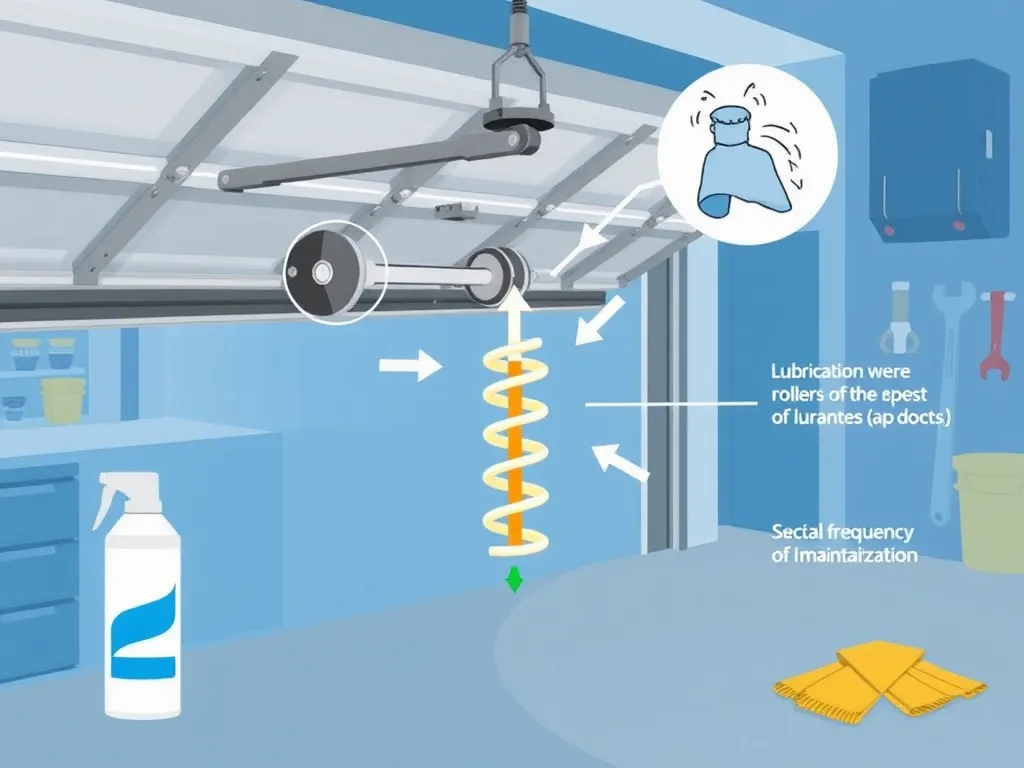Essential Guide: How Often Should You Lubricate Garage Door Parts?

Essential Guide to Garage Door Maintenance
Garage Door Maintenance is an essential aspect of homeownership that often goes overlooked. A well-maintained garage door not only ensures the safety and security of your home but also adds value and curb appeal. Regular upkeep can prevent costly repairs and extend the lifespan of your garage door. In this article, we will delve into the various components of garage door maintenance and provide you with actionable tips to keep your door in tip-top shape.
One crucial aspect of Garage Door Maintenance is understanding the mechanisms behind its operation. Garage doors consist of several parts including springs, rollers, tracks, and the opener. Each component needs occasional inspection and maintenance to ensure smooth operation. Neglecting these parts can lead to breakdowns, unsafe conditions, and potential accidents. Therefore, regular checks and services are advisable to keep everything functioning properly.
Another important area of Garage Door Maintenance is lubrication. Proper lubrication of moving parts is crucial to the operational efficiency of your garage door system. It minimizes friction, reduces wear and tear, and promotes quiet functionality. Lubricating your garage door not only enhances its performance but also prolongs its lifespan. In the following sections, we will give detailed insights into lubrication techniques and schedules.
Safety is paramount when it comes to Garage Door Maintenance. Whether you are performing a DIY maintenance check or hiring a professional, ensuring that safety protocols are followed is paramount. Understanding the mechanisms and potential hazards associated with garage doors can prevent accidents and injuries. Let’s explore the importance of lubrication, common types of lubricants, a lubrication schedule, the DIY lubrication process, and when to seek professional help.
To ensure optimal performance, it’s crucial to incorporate seasonal lubrication during your regular maintenance checks.
In conclusion, Garage Door Maintenance is not just a task, but a commitment to ensuring the longevity and performance of your garage door. Through regular checks, timely lubrication, and safe practices, you can keep your garage door functioning efficiently and safely for years to come.
Importance of Lubrication
Lubrication is a vital part of Garage Door Maintenance. By regularly applying lubricant to the moving parts of your garage door, you ensure smoother operation. Lubricating components such as the springs, hinges, and rollers helps reduce friction, preventing parts from wearing down too swiftly and leading to a breakdown.
Implementing a usage-based schedule can significantly enhance the longevity of your garage door system.
Proper lubrication prevents wear and tear on mechanical components. It creates a protective barrier that reduces friction between parts, minimizing the risk of damage. Regularly lubricating your garage door components can save you money in the long run by avoiding expensive repairs due to neglected parts.
Regular lubrication can significantly impact the longevity of your garage door. A well-lubricated system operates quietly and efficiently, reducing the stress on components and preserving their function over time. Therefore, incorporating a lubrication schedule into your Garage Door Maintenance routine is essential for extending the lifespan of your garage door.
Regularly assessing your maintenance frequency will help you prevent costly repairs and ensure smooth operations.
Types of Lubricants for Garage Doors
When it comes to lubricating garage doors, the best lubricants for metal parts include silicone-based and lithium-based grease. Silicone is excellent for sensitive areas and does not attract dirt, while lithium grease offers robust protection and workability. Both types should be considered in your maintenance routine.
Silicone lubricants are preferred for their ability to repel moisture and dirt, making them ideal for garage doors exposed to the elements. On the other hand, oil-based lubricants are suitable for parts requiring thicker, longer-lasting coverage. Understanding the difference can help in choosing the right lubricant for your garage door's specific needs.
Choosing the right lubricant involves understanding when to use grease versus spray. Grease is typically used on parts that experience high pressure, such as springs, while sprays are more suited for hinges and rollers where light coverage is needed. Knowing the right application can make a significant difference in maintenance effectiveness.
Lubrication Schedule
How often to lubricate your garage doors should generally be twice a year, but this can vary depending on environmental conditions. Areas with high humidity or extreme temperatures may require more frequent lubrication to protect against rust or freezing.
Seasonal maintenance considerations are important; for instance, before winter, a thorough lubrication check can prevent cold-weather issues. Conversely, in the spring or after heavy rains, it might be wise to assess the lubrication state as well to prepare for the hotter months.
Signs that lubrication is needed may include unusual noises when operating the door, visible wear on moving parts, or sluggish movement. If you notice any of these symptoms, it’s time to attend to the lubrication of your garage door to prevent further issues.
DIY Lubrication Process
When performing DIY lubrication, start by cleaning the door tracks and removing any debris. Then, proceed to apply your chosen lubricant, making sure to cover all moving parts uniformly. Operate the door a few times after application to ensure the lubricant spreads evenly.
Common mistakes to avoid include overloading lubricants, which can attract dirt, causing more harm than good. Another mistake is neglecting to clean components before lubrication, which can lead to a buildup of grime that prevents proper operation.
Safety precautions during lubrication include wearing gloves to avoid contact with lubricant and ensuring the garage door is disconnected from its opener before starting any work. Moreover, keep children and pets away from the garage area while conducting maintenance.
Professional Garage Door Maintenance
You should consider hiring an expert for garage door maintenance if you lack experience or if your door exhibits complex issues. Additionally, if you’re uncomfortable performing repairs or maintenance, calling in a professional is a wise decision.
The benefits of professional lubrication services include thorough inspections and targeted fixes. Experts know precisely what to look for and can address any underlying issues that might go unnoticed in a DIY check.
The cost of hiring a garage door technician can vary widely based on your location and the specific services required. However, compared to the potential costs of major repairs down the line, investing in professional maintenance can be very cost-effective.
